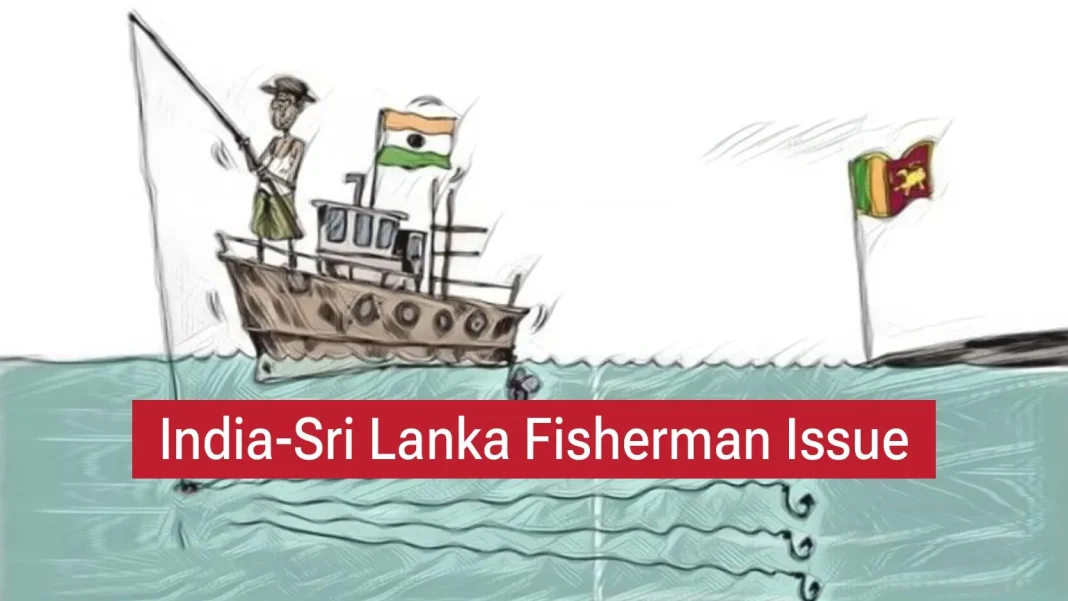The long-standing fisheries dispute between India and Sri Lanka has once again come to the forefront following recent arrests of Indian fishermen by the Sri Lankan Navy. The Palk Bay region, shared by both nations, remains a hotspot of contention, with Indian fishermen frequently crossing into Sri Lankan waters and facing legal repercussions. As tensions escalate, both governments must seek sustainable solutions that ensure the livelihood of fishing communities while respecting maritime boundaries.
In This Article:
Recent Developments in the Dispute
On February 8, 2025, the Sri Lankan Navy arrested 14 Indian fishermen from Tamil Nadu’s Ramanathapuram district for alleged poaching near Mannar. Two trawlers were seized in the operation. This comes shortly after an incident on January 27, when Sri Lankan authorities fired at an Indian boat near Delft Island, injuring two fishermen. The cumulative number of Indian fishermen arrested this year has now risen to 77.
In 2024, over 500 Indian fishermen were detained by Sri Lanka, marking a sharp increase compared to the past decade. A Tamil Nadu government report states that 97 fishermen and 216 fishing boats remain in Sri Lankan custody. Unlike past instances where detained fishermen were quickly released, recent years have seen an increase in convictions and stricter legal actions.
Historical Context and Causes of the Conflict
The root of the fisheries dispute lies in the shared waters of the Palk Bay, where Indian and Sri Lankan fishermen have historically fished without clear boundaries. However, the 1974 and 1976 Indo-Sri Lankan maritime agreements officially delineated the International Maritime Boundary Line (IMBL). The Katchatheevu Island, which was ceded to Sri Lanka in 1974, further complicated the situation.
Indian fishermen, particularly from Tamil Nadu and Puducherry, often cross into Sri Lankan waters due to declining fish stocks on their side of the IMBL. This has sparked opposition from Sri Lankan fishermen, particularly those in the Tamil-majority Northern Province, who are still recovering from the impact of Sri Lanka’s civil war. They argue that Indian trawlers, especially those practicing bottom trawling, severely damage marine ecosystems and threaten their livelihoods.
Legal and Diplomatic Challenges
Sri Lanka has adopted a stricter approach to enforcing its maritime boundaries. Courts in Sri Lanka are now imposing heavy fines and even prison sentences for Indian fishermen, making diplomatic resolutions increasingly challenging. While India has historically sought diplomatic channels to negotiate releases, the Sri Lankan government under Anura Kumara Dissanayake has shown reluctance to engage in direct negotiations with Indian fishermen.
The situation is further complicated by the fact that arrests of Indian fishermen by Sri Lanka far exceed similar incidents involving Pakistan, Bangladesh, Saudi Arabia, and Qatar. This highlights the need for a tailored approach that addresses the unique challenges of the Palk Bay region.
Possible Solutions to the Fisheries or Water Dispute
- Revival of Fishermen Talks: The last formal meeting between Indian and Sri Lankan fishermen took place in November 2016. A fresh round of discussions should be facilitated to promote dialogue and find a mutually acceptable resolution.
- Transition Away from Bottom Trawling: The Indian government must incentivize fishermen to adopt sustainable fishing practices and move away from bottom trawling. Subsidies, financial assistance, and alternative livelihood programs can help ease this transition.
- Joint Fishing Agreements: A temporary arrangement allowing regulated fishing in disputed waters can be explored. This can be implemented through seasonal fishing permits or designated fishing zones to prevent clashes.
- Improved Surveillance and Monitoring: Both India and Sri Lanka should enhance maritime surveillance to prevent inadvertent border crossings. Installing GPS tracking systems on fishing boats can also help monitor movement.
- Diplomatic Engagement: India must continue to push for diplomatic negotiations with Sri Lanka at the highest levels, ensuring that fishermen’s rights and livelihoods are protected while respecting international boundaries.
The India-Sri Lanka fisheries dispute requires urgent intervention to prevent further escalation. A combination of proactive diplomacy, sustainable fishing policies, and direct engagement between fishermen can pave the way for a long-term resolution. The governments of both nations must recognize that a “business-as-usual” approach is no longer viable and work together to ensure a peaceful and sustainable future for the fishing communities of the Palk Bay region.
By – Jyothi



